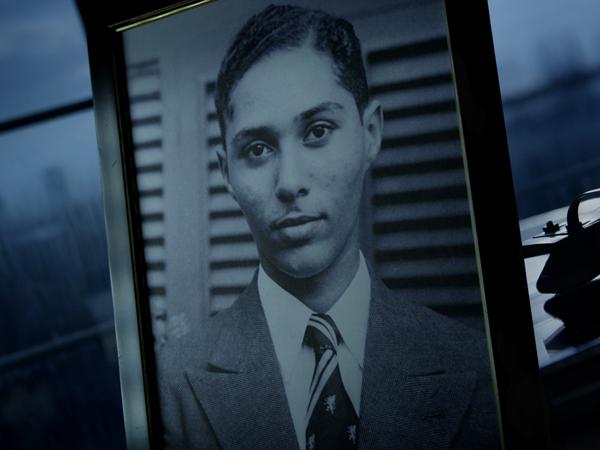Our author Morgan Quaintance pays tribute to one of the world's leading intellectuals, the sociologist and cultural theorist Stuart Hall.

John Akomfrah, film still The Stuart Hall Project, 2013 © ICA
On Monday, 10 February 2014, Stuart McPhail Hall, sociologist, cultural theorist, philosopher, teacher, husband and father, died age 82. In the near century since his birth in Kingston, Jamaica, he left an indelible mark on British intellectual life. His most extraordinary achievement was in mounting a sustained and successful challenge to entrenched, retrograde notions of Britishness, essentially rooted in outmoded hierarchical ideas and the preservation of aristocratic privilege. Alongside compadres like Raymond Williams and Richard Hoggart, Hall dismantled both this monocultural conception of British identity and the elitist and patrician edifice of culture and society that supported it.
On the surface, Hall’s early project was to redress the imbalance between so-called ‘high culture’ over more popular forms of art and entertainment like cinema, music and television. However, implicit in this activity was a much broader critique of class divides, colonial attitudes and imperialist ideology. These were systems of thought that not only informed the intolerable Caribbean caste system prevalent in his childhood, but also extended to other oppressive regimes of power that had an international reach. Although the seeds of this activity were sown in Jamaica, Hall’s critical relationship with a mythic British national identity began in 1951 when, three years after the Empire Windrush brought its first cargo of able bodies, he left Jamaica to read English at Oxford University. What followed was an astonishing career of academic achievement, political activism and extraordinary theoretical innovation.
The first time I heard Hall speak was Saturday, 28 October 2000. He was appearing as a panel member of ‘Black Futures’, a conference that took place at London’s ICA (Institute of Contemporary Arts), featuring, among others, writer Zadie Smith, architect David Adjaye and cultural commentator Ekow Eshun. I remember being struck by Hall’s equanimity and what seemed a remarkable ability to couch astute critical observations in the most amiable and disarming disposition. Here was a man that obviously had a massive knowledge base, but he possessed none of the macho posturing and condescension that I had come to expect from theoreticians keen to reinforce their intellectual superiority. Knowledge, as it travelled from him out to me, was presented as an open field anyone could gain access to. Following that day, I read as much of Hall’s writing as I could lay my hands on, paying close attention to critical work he undertook in relation to black identity.
Thirteen years would pass before I finally got the opportunity to speak with him. I had written a short essay about Hall’s friendship with Williams for INIVA and remarkably he read it. Through a mutual friend he extended an invitation for me to come to his home and talk more about the text. I was terrified and excited. What would it be like to meet the man so responsible for structuring how I thought? It would perhaps come as close as I would get to a secular experience of meeting my maker. In the end our conversation was brief, but warm. We spoke on the phone and arranged a provisional day to meet the following week. I had just returned from a trip to Benin filming a documentary on the artist Meschac Gaba, to be broadcast by the BBC alongside a profile of Sudanese painter Ibrahim El Salahi, and so I was eager to share my observations about this experience with him.
Unfortunately, a few days after our conversation, I broke my ankle in a sporting accident. In the ensuing personal upheaval and painkiller induced mental haze, our meeting was never confirmed. Over the six-month period it took me to fully recover, I thought about calling to explain my immobility and to set up a future date we could meet. But, as I knew Hall himself was in ill health, I didn’t want to impose. And so, time stretched on and the distance between our initial conversation grew into a chasm of unfamiliarity, which seemed almost impossible to cross.
When I heard the news of his death I felt the full weight of a colossal missed opportunity. Coupled with my own regret was a feeling of deep sadness that such an important world presence had passed away, particularly at the moment when it seemed the world needed him most. But, reading through old essays and books he had written, it occurred to me that Hall lived on within the text. I realised I was free to converse with him any time I chose, all I would have to do is pick up a book and enter that subvocal universe of address, accessible through his written words, sentences and paragraphs. There was something else, too. More than a legacy of knowledge, Hall, in recordings of public speech and debate, and in my own memory of him on that day, left me a way of being, a behavioural model to aspire to. As such, he is there in my attempted openness, approachability and astuteness; and he is always there in that twinkle of an eye, that infectious beguiling chuckle that I haven’t quite perfected yet.
Morgan Quaintance is a writer, broadcaster and curator. He is the producer of Studio Visit, a weekly radio show broadcast on London’s Resonance 104.4FM, featuring international artists as guests. As a presenter he works with the BBC’s flagship arts programme, the Culture Show.
More Editorial